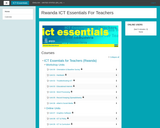
stuff
- Subject:
- Education
- Material Type:
- Full Course
- Provider:
- Ministry of Education (Rwanda)
- Author:
- Rwanda Education Board
- Date Added:
- 11/30/2016

Teachers can organize the physical environment to ensure technology supports different learning methodologies in an inclusive manner.

stuff
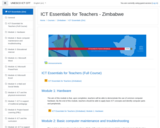
This course is designed to provide teachers with the skills and competencies needed to both incorporate information and communications technology (ICT) in their teaching as well as to use it for their professional development.
The course covers a wide range of thematic areas, from basic computer use and maintenance (including hardware, software, applications and troubleshooting) through to internet, email, and social media in the educational context. Through the course, teachers will develop the skills to understand, evaluate and operationalize ICT within the context of related national educational policies, integrate ICT in education from a pedagogical perspective, manage learners’ project-based learning (PBL) activities in a technology-enhanced environment and even integrate ICT into the curriculum.
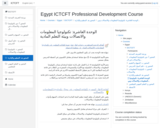
By the end of this unit teachers should be able to:
Technological literacy 5- (a) Integrating the activity of using computer labs in teaching activities on a continuous basis.
Technology Literacy 5- (b) Work to manage the process of using complementary information and communication technology resources with individuals and small groups of students in the regular classroom so that other educational activities in the classroom are not disrupted.
Deepening knowledge 5- (a) Placing and organizing computers and other digital resources in the classroom so that learning activities and social interactions are supported and enhanced among the classroom students.
بحلول نهاية هذه الوحدة ، يجب أن يكون المعلمون قادرين على:
محو الأمية التكنولوجية 5- (أ) تكامل نشاط استخدام معامل الكمبيوتر في الأنشطة التعليمية بشكل مستمر.
محو الأمية التكنولوجية 5- (ب) العمل على إدارة عملية استخدام موارد تكنولوجيا المعلومات والاتصالات التكميلية مع الأفراد والمجموعات الصغيرة من الطلاب في الفصول الدراسية العادية حتى لا تتعطل الأنشطة التعليمية الأخرى في الفصل.
تعميق المعرفة 5- (أ) وضع وتنظيم أجهزة الكمبيوتر والموارد الرقمية الأخرى في الفصل الدراسي بحيث يتم دعم وتعزيز الأنشطة التعليمية والتفاعلات الاجتماعية بين طلاب الفصل.
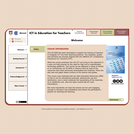
This course has been developed to support the training of teachers to integrate ICT into their teaching practices. The materials, guides and activities are strongly aligned with the UNESCO ICT Competency Framework for Teachers (CFT).
While the course embraces the role ICT can bring to the classroom it is also not held prisoner by the need for high end or sophisticated technology platforms. The course can be deployed in areas of limited or no connectivity via CD ROM or memory stick as most of the resources have been previously downloaded and collected. There are also web and paper based versions of the lessons and guides.
This course uses materials that are Open Education Resources (OER) or free to use for educational purposes, allowing the use and distribution, and in some instances the repurposing of the materials, at no additional cost. (See the Open License tab for more information).
But most importantly we hope the lessons are fun and engaging enough to introduce new possibilities and refresh the participant's passion for teaching and learning.
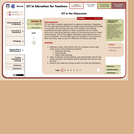
A unit of study of how ICT can offer a quality supplement to classroom teaching. The Objective is to learn how integrating ICT into daily learning activities can assist students learning individually or in groups.
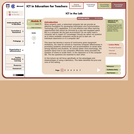
A unit of study of the efficacy of a networked computer lab in providing an effective foundation for developing ICT capabilities. The objective is to investigate issues around setting up and teaching in a laboratory environment.
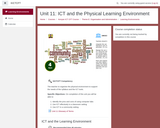
The teacher to organise the physical environment to support the needs of the syllabus and the ICT tools. Specific Objectives: On completion of this unit you will be able to: 1] Identify the pros and cons of using computer labs, 2] Use ICT effectively in a classroom setting, and 3] Use ICT in a community setting.
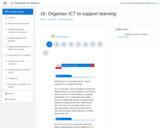
This unit of study explores how to logistically arrange lessons and activities to include ICT tools e.g. laptops, whiteboards, TV's, smartphones and tablets. Laboratories, classrooms and remote learning will be covered.
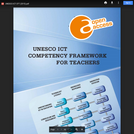
UNESCO’s Framework emphasizes that it is not enough for teachers to have ICT competencies and be able to teach them to their students. Teachers need to be able to help the students become collaborative, problemsolving, creative learners through using ICT so they will be eff ective citizens and members of the workforce. The Framework therefore addresses all aspects of a teacher’s work:
Understanding ICT in Education
Curriculum and Assessment
Pedagogy
ICT
Organisation & Administration
Teacher Professional Learing
The Framework is arranged in three diff erent approaches to teaching (three successive stages of a teacher’s development). The first is Technology Literacy, enabling students to use ICT in order to learn more effi ciently. The second is Knowledge Deepening, enabling students to acquire in-depth knowledge of their school subjects and apply it to complex, real-world problems. The third is Knowledge Creation, enabling students, citizens and the workforce they become, to create the new knowledge required for more harmonious, fulfi lling and prosperous societies.